Valet services primarily handle parking and vehicle retrieval, ensuring a seamless arrival and departure experience for hotel guests. Bellhops focus on luggage assistance, guiding guests to their rooms and providing information about hotel amenities. Both roles enhance guest satisfaction by offering personalized and efficient service tailored to hospitality settings.
Table of Comparison
| Feature | Valet | Bellhop |
|---|---|---|
| Primary Role | Parking and retrieving guest vehicles | Assisting guests with luggage |
| Core Responsibility | Safe vehicle handling and parking | Transporting luggage to guest rooms |
| Location | Hotel entrance or designated valet area | Lobby and guest floors |
| Customer Interaction | Brief, focused on vehicle service | Personalized, guest-focused assistance |
| Required Skills | Driving proficiency, vehicle knowledge | Physical strength, customer service |
| Common Titles | Valet attendant, parking attendant | Bellhop, bellman, porter |
| Typical Venues | Hotels, restaurants, event venues | Hotels, resorts, cruise ships |
Overview of Valet and Bellhop Roles
Valets specialize in parking and retrieving guests' vehicles efficiently, ensuring a seamless arrival and departure experience at hotels and event venues. Bellhops assist guests with luggage, providing prompt delivery to rooms and offering personalized services that enhance overall guest satisfaction. Both roles are critical in the hospitality industry, emphasizing speed, courtesy, and professionalism to maintain high service standards.
Key Responsibilities of a Valet
A valet in the hospitality industry primarily handles parking and retrieving guests' vehicles efficiently, ensuring safety and prompt service. Key responsibilities include managing parking logistics, maintaining vehicle security, and providing courteous assistance to enhance guest satisfaction. Valets often coordinate with hotel staff to streamline guest arrivals and departures, contributing to a seamless hospitality experience.
Essential Duties of a Bellhop
Bellhops primarily assist guests with luggage handling, escorting them to their rooms, and providing information about hotel amenities. Their essential duties include delivering luggage, coordinating transportation requests, and responding promptly to guest inquiries to enhance overall satisfaction. Unlike valets who focus on parking vehicles, bellhops serve as the immediate face of customer service within the hotel lobby.
Skills Required: Valet vs Bellhop
Valets require exceptional driving skills, familiarity with various vehicle types, and the ability to navigate tight parking spaces efficiently while maintaining vehicle safety and security. Bellhops focus on strong customer service, physical stamina to handle luggage, and knowledge of hotel layout to assist guests promptly. Both roles demand excellent communication and professionalism to enhance the guest experience in hospitality settings.
Customer Interaction: Frontline Service
Valet attendants primarily engage with customers during vehicle drop-off and pick-up, offering personalized curbside service that emphasizes convenience and efficiency. Bellhops interact with guests inside the hotel, assisting with luggage and providing a welcoming, face-to-face experience that enhances first impressions. Both roles require strong communication skills and a friendly demeanor to ensure positive customer interactions and elevate overall guest satisfaction.
Training and Certification Differences
Valet attendants typically undergo specialized training in vehicle handling, parking techniques, and security protocols, often requiring certification in defensive driving and customer service. Bellhops focus on luggage handling, guest assistance, and hospitality etiquette, receiving training in communication skills and safety procedures but rarely need formal certification. These distinct training paths reflect their specialized roles within the hospitality industry, ensuring both valet and bellhop staff meet service quality and safety standards.
Physical Demands of Each Position
Valet positions in hospitality require continuous physical stamina, including standing for long periods, walking, and quickly maneuvering vehicles in tight spaces. Bellhops face intense physical demands involving lifting heavy luggage, assisting guests with bags multiple times per shift, and navigating stairs or elevators while maintaining balance. Both roles demand strong physical endurance, but valets emphasize precision and agility, whereas bellhops prioritize strength and carrying capacity.
Work Schedule and Shift Patterns
Valet attendants typically work in shifts aligned with peak arrival and departure times, often including evenings, weekends, and holidays to accommodate fluctuating guest traffic. Bellhops tend to follow more consistent schedules, usually covering early morning to late evening hours, supporting luggage handling and guest assistance during check-in and check-out periods. Both roles require flexibility, but valet shifts can be more variable due to demand-driven vehicle management needs.
Career Progression Opportunities
Valet attendants often advance into supervisory roles managing parking operations or transition into fleet management, leveraging their expertise in logistics and customer service. Bellhops typically progress to front desk positions, concierge roles, or guest services management, capitalizing on their direct guest interaction experience. Both career paths offer opportunities to develop leadership skills and expand responsibilities within the hospitality industry.
Salary and Benefits Comparison
Valets typically earn an average hourly wage of $12 to $15, while bellhops command slightly higher pay, ranging from $13 to $18 per hour due to their broader range of customer service responsibilities. Benefits for bellhops often include tips, health insurance, and occasional lodging discounts, whereas valet employees frequently receive similar perks but with a stronger emphasis on vehicle-related liability coverage. Both roles may qualify for employer-sponsored benefits such as paid time off and retirement plans, but bellhops generally experience more consistent income through combined wages and gratuities.
Valet vs Bellhop Infographic

 jobdiv.com
jobdiv.com